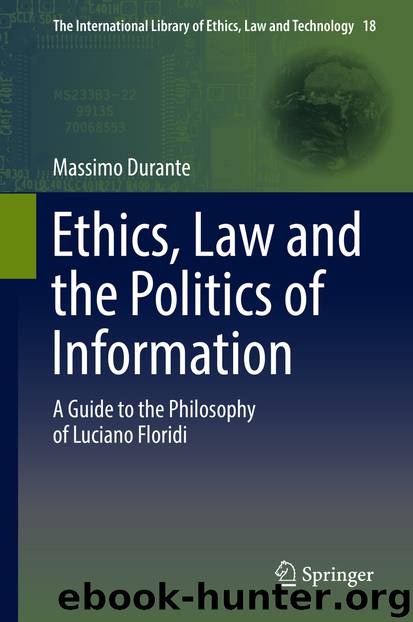Ethics, Law and the Politics of Information by Massimo Durante

Author:Massimo Durante
Language: eng
Format: epub
Publisher: Springer Netherlands, Dordrecht
6.6 Ontological Pluralism
Floridi (2008a) has always stressed that the impoverishment of the infosphere depends on the destruction of informational objects and not of information as such. This statement has to be correctly understood: it means that the impoverishment of the infosphere is tragically real and does not leave the world as it finds it. However, it does not conceive the destruction of informational objects as with any other ontic destruction: indeed, it considers such destruction from an ontological point of view as the destruction of objects qua informational objects, namely, in what way they are informational. It is precisely the value of information that is destructed, that is to say, the relational points of lack of uniformity: a sum of differences.
Thanks to the differences that each informational object is meant to introduce into the infosphere, Being is not, in Floridi’s view, a catalogue of objects that strive to protect and conserve themselves (an indiscriminate and conservative attitude towards the status quo). On the contrary, Being grows out of the flourishing of differences that allow informational objects to be what they are, namely, to be recognized for their own identity, that is to say, to be distinguished from each other. What many scholars fail to acknowledge is that Floridi’s ontology, which IE is based on, is not only hospitable (namely, it attempts to widen the class of entities that deserve a minimal level of respect) but it is, first and foremost, pluralistic (namely, it is aimed to broaden the set of differences that develop and enrich the infosphere from both an epistemological and an ecological standpoint).
This form of pluralism is ontological, because it does not concern the differences that cause entities to vary according to (the multiple set of) second-order qualities that are mere qualifications of the same entity (the same ‘seat’ can be white or black, cheap or expensive, etc.). It concerns the differences that make entities be what they are and to differ from a set of related objects: there is no ontological pluralism, i.e., the richness of Being, without a principium individuationis, which is conceived, here, in informational terms. According to the IE, the multiplicity of ontological pluralism (the Spinozian multitude) is made up of a sum of differences and a sum of relations (“relational points of lack of uniformity”). The proliferation of LoAs is ultimately based in those sets of differences and relations that enable the same entities to be distinguished among different relations (of cohering clusters of data). This point is important, since it shows us that the multiplicity of informational objects and, correspondingly, of LoAs is not entrenched in any form of relativism. On the contrary, it is the wealth of the informational status of the object (a sum of differences and a sum of relations) that governs the multiplicity of representations of the object itself.
Floridi’s endorsement of a pluralistic approach (both to epistemology and ethics) is not a matter of a subjective preference (for pluralism), but is deeply rooted in his ontological equality principle, that is, in the correlation between the proliferation of points of view (i.
Download
This site does not store any files on its server. We only index and link to content provided by other sites. Please contact the content providers to delete copyright contents if any and email us, we'll remove relevant links or contents immediately.
Algorithms of the Intelligent Web by Haralambos Marmanis;Dmitry Babenko(18334)
Jquery UI in Action : Master the concepts Of Jquery UI: A Step By Step Approach by ANMOL GOYAL(10487)
Test-Driven Development with Java by Alan Mellor(7768)
Data Augmentation with Python by Duc Haba(7641)
Principles of Data Fabric by Sonia Mezzetta(7409)
Learn Blender Simulations the Right Way by Stephen Pearson(7323)
Microservices with Spring Boot 3 and Spring Cloud by Magnus Larsson(7162)
Hadoop in Practice by Alex Holmes(6753)
RPA Solution Architect's Handbook by Sachin Sahgal(6540)
The Infinite Retina by Robert Scoble Irena Cronin(6249)
Big Data Analysis with Python by Ivan Marin(5971)
Life 3.0: Being Human in the Age of Artificial Intelligence by Tegmark Max(5558)
Pretrain Vision and Large Language Models in Python by Emily Webber(4927)
Infrastructure as Code for Beginners by Russ McKendrick(4681)
Functional Programming in JavaScript by Mantyla Dan(4564)
WordPress Plugin Development Cookbook by Yannick Lefebvre(4424)
The Age of Surveillance Capitalism by Shoshana Zuboff(4293)
Embracing Microservices Design by Ovais Mehboob Ahmed Khan Nabil Siddiqui and Timothy Oleson(4180)
Applied Machine Learning for Healthcare and Life Sciences Using AWS by Ujjwal Ratan(4162)
